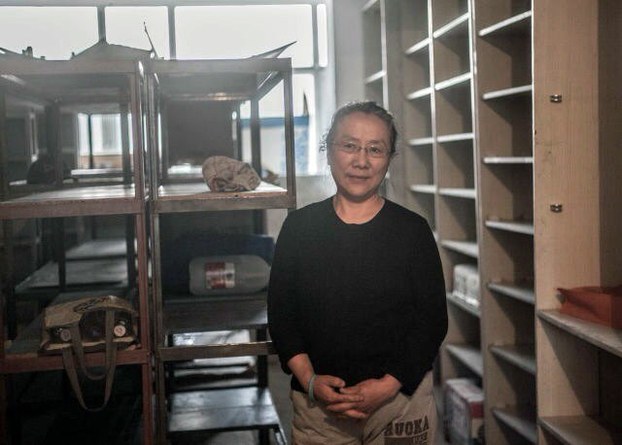| Radio Free Asia |
| December 5, 2014 |
| Washington Dc |
 |
|
| Xinna in the storeroom of her bookstore in an undated photo. |
Hada, in his mid-50s, is being held under de facto house arrest after 15 years in jail on charges of "separatism" and "espionage."
He should be scheduled for release on Tuesday or Wednesday, when his four-year period of "deprivation of political rights" will end, his wife Xinna told RFA.
"Hada wasn't released when his jail term ended, but was locked up for a further four years while being deprived of his political rights, according to the police department," she said. "In effect, he has been illegally detained for the past four years."
"By that rationale, they should be releasing him on Dec. 9, but when I spoke to the state security police in charge of Hada, they said it wasn't their case anymore," she added.
"This should mean he is released by Wednesday at the latest, but his family is extremely worried because it's still not clear if he will be released or not," Xinna said.
Deprivation of rights
Deprivation of political rights refers in Chinese law to the right to vote or be selected as an electoral candidate and the rights of freedom of speech, the press, assembly, association and demonstration, as well as the right to hold government office or a job in a state-run organization.
However, it is sometimes used as a pretext for further restrictions on released political prisoners.
Hada, in his mid-50s, is being held under extrajudicial detention after 15 years in jail on charges of "separatism" and "espionage" at the Jinye Ecological Park in the regional capital Hohhot.
Family members and rights activists say he is suffering from deteriorating mental health and has been denied medical treatment.
The authorities have told Xinna they are keeping Hada under house arrest because his family will not "cooperate" or stop speaking out about his case.
Xinna said the couple's grown son Uiles had also called police to inquire about his father on Friday.
"My son called the police station to ask if he could take some clothing for him to wear on his release," she said. "He also asked whether his release was scheduled for Tuesday or Wednesday, but they said they'd have to ask for us."
She said her husband's treatment at the hands of authorities was unacceptable.
"They have already crossed the line by not releasing him at the end of his sentence, while our requests to send cold-weather clothing and to clarify [his release date]...are entirely reasonable," Xinna said.
"Now they say it's not their case...The police and the Communist Party political and legal affairs committee are behaving entirely unreasonably; it's a huge joke," she said.
"I am absolutely furious."
Still unclear
Enhebatu Togochog, director of the New York-based Southern Mongolian Human Rights Information Center (SMHRIC), which has been following Hada's case closely, said it was still unclear whether he would be released next week.
"[Xinna] hasn't been put under house arrest, but she is still on the receiving end of police harassment," he said.
"They should release [Hada], but no one knows if they will. I'm guessing the authorities will take him to a different place instead, and then claim that they have already released him."
Rights groups say they have tracked a sharp increase in the use of arbitrary detention and torture by Chinese authorities against rights activists in recent years.
Prominent rights attorney Gao Zhisheng was subjected to a "disappearance" of more than a year after he defended some of China's most vulnerable people, including Christians, coal miners and followers of the banned Falun Gong spiritual movement.
In July, Xinna wrote letters to Chinese President Xi Jinping, the United Nations Human Rights Council and the U.S. Congressional Committee on Human Rights to highlight Hada's case.
Since then, authorities in Inner Mongolia turned hostile and began their current round of persecution, including harassment by cell phone, warnings not to publish posts on overseas websites, Internet service cutoffs, and threats to punish Xinna for publishing "illegal" posts online, she said.
Reported by Qiao Long for RFA's Mandarin Service, and by Hai Nan for the Cantonese Service. Translated and written in English by Luisetta Mudie.





 Beyond
Great Walls: Environment, Identity, and Development on the Chinese
Grasslands of Inner Mongolia
Beyond
Great Walls: Environment, Identity, and Development on the Chinese
Grasslands of Inner Mongolia China's
Pastoral Region: Sheep and Wool, Minority Nationalities, Rangeland
Degradation and Sustainable Development
China's
Pastoral Region: Sheep and Wool, Minority Nationalities, Rangeland
Degradation and Sustainable Development The
Ordos Plateau of China: An Endangered Environment (Unu Studies on
Critical Environmental Regions)
The
Ordos Plateau of China: An Endangered Environment (Unu Studies on
Critical Environmental Regions)